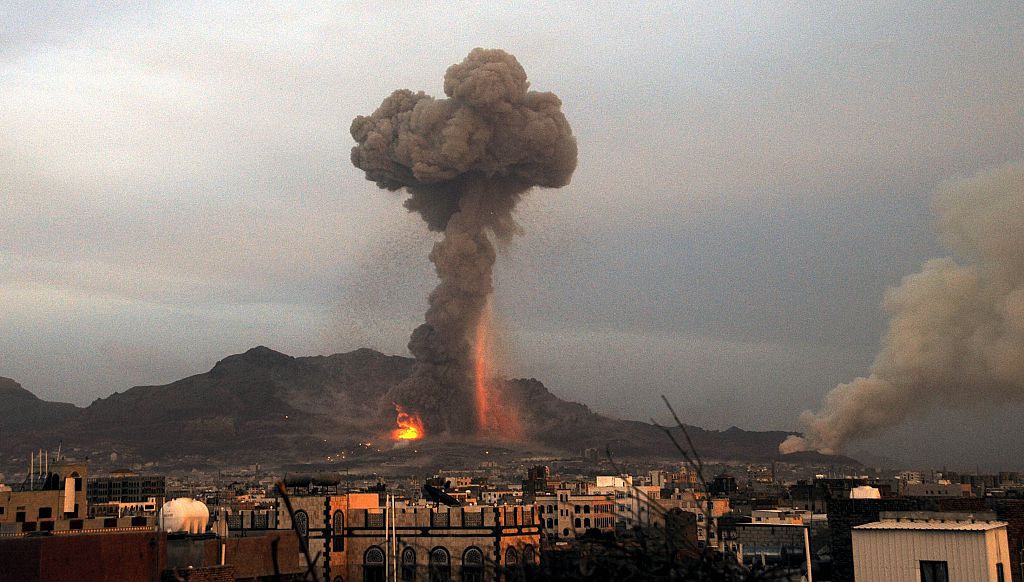 Print This Post
Print This Post- The Strategist - https://www.aspistrategist.org.au -
Yemen: money over morality
Posted By James Brorson on November 8, 2019 @ 13:50

Article printed from The Strategist: https://www.aspistrategist.org.au
URL to article: https://www.aspistrategist.org.au/yemen-money-over-morality/
[1] 12,000 civilians: https://www.acleddata.com/2019/10/31/press-release-over-100000-reported-killed-in-yemen-war/
[2] partially withdrawn: https://worldview.stratfor.com/article/yemen-united-arab-emirates-uae-trades-involvement-yemen-conflict-stronger-regional-role
[3] still backing: https://www.aljazeera.com/news/2019/08/yemeni-official-uae-won-aden-saudi-silent-slaughter-190811144214211.html
[4] failed political transition: https://www.sciencespo.fr/kuwait-program/wp-content/uploads/2018/05/KSP_Paper_Award_Spring_2017_SALMUTTER_Kim.pdf
[5] backed by: https://www.washingtonpost.com/world/un-report-says-us-britain-france-complicit-in-potential-war-crimes-in-yemen/2019/09/03/ad278cf6-ce48-11e9-9031-519885a08a86_story.html
[6] warned: http://www.arabstates.undp.org/content/rbas/en/home/library/crisis-response0/assessing-the-impact-of-war-on-development-in-yemen-.html
[7] Australia: https://parlinfo.aph.gov.au/parlInfo/download/committees/estimate/c8ae66cc-37da-4c79-a94b-6ab2906174ff/toc_pdf/Foreign%20Affairs,%20Defence%20and%20Trade%20Legislation%20Committee_2019_02_20_6950_Official.pdf;fileType=application%2Fpdf#search=%22committees/estimate/c8ae66cc-37da-4c79-a94b-6ab2906174ff/0000%22
[8] France: https://www.alaraby.co.uk/english/news/2019/5/9/macron-defends-saudi-arms-exports-amid-yemen-war-criticism
[9] US: https://www.congress.gov/116/crec/2019/06/04/CREC-2019-06-04.pdf#page=128
[10] leaked document: https://made-in-france.disclose.ngo/en/chapter/yemen-papers/
[11] 19,000 air raids: https://interactive.aljazeera.com/aje/2018/Saudi-Arabia-air-raids-on-Yemen/index.html
[12] US$27 billion: https://securityassistance.org/publication/trends-major-us-arms-sales-2018-trump-record-rhetoric-versus-reality
[13] 25 unlawful coalition air strikes: https://static1.squarespace.com/static/5b3538249d5abb21360e858f/t/5c7f53f7b208fc58dbada030/1551848449753/%2522Day+of+Judgement%2522.pdf
[14] being used in the Yemen conflict: https://www.defenseone.com/business/2016/08/us-tank-deal-exposes-saudi-losses-yemen-war/130623/
[15] transferring: https://carnegieendowment.org/2019/02/19/american-weapons-in-wrong-hands-pub-78408
[16] UAE’s second-largest and Saudi Arabia’s third-largest: https://www.sipri.org/publications/2019/sipri-fact-sheets/military-spending-and-arms-imports-iran-saudi-arabia-qatar-and-uae
[17] roughly: https://www.lawfareblog.com/lessons-uae-war-yemen
[18] sale: https://www.abc.net.au/news/2019-02-20/australian-firm-eos-weapons-systems-bound-for-saudi-arabia/10825660
[19] remote weapons systems: https://www.abc.net.au/news/2019-07-25/australian-company-sending-weapons-systems-directly-to-uae/11322974
[20] selling weapons: https://www.theguardian.com/science/2019/jul/30/australian-weapons-maker-eos-insists-none-of-its-products-used-in-yemen
[21] investigative journalists: https://edition.cnn.com/interactive/2018/09/world/yemen-airstrikes-intl/
[22] NGOs: https://www.amnesty.org/en/latest/news/2015/09/yemen-the-forgotten-war/
[23] unlawful: https://www.amnesty.org/en/latest/news/2019/06/ukappeal-court-ruling-on-saudi-arms-is-welcome-decision-for-wartorn-yemen/
[24] necessary votes: https://www.defensenews.com/congress/2019/07/29/us-senate-allows-arms-sales-to-saudi-arabia-sustaining-trump-vetoes/
[25] Nelson Alusala: https://issafrica.org/iss-today/how-can-arms-embargoes-be-made-more-effective
[26] the public: https://www.independent.co.uk/news/uk/politics/saudi-arabia-arms-sales-theresa-may-britain-extremist-funding-poll-public-a7843061.html
[27] argued: https://www.aspistrategist.org.au/action-needed-to-stop-australian-defence-exports-being-used-in-the-war-in-yemen/